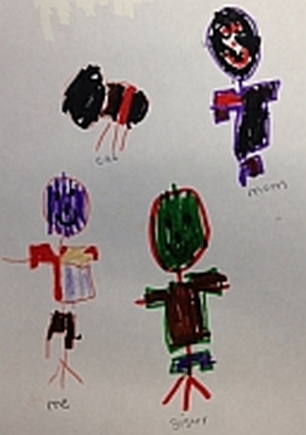
A couple of weeks ago, my counselor gave me an assignment. He asked me to describe my sadness, in writing. For those of you who have experience with depression, you know that at times when you are out of the depression, it can be hard to remember exactly what it felt like or to put it in words. I believe he was looking for some quantification of my depression, in order to better understand how it is for me; because truly, it is different for everyone.
As I sat down to complete this assignment, I was reminded of the hours I spent in my youth compiling endless lists of quotes on depression from other writers. There is a book called Unholy Ghost: writers on depression that I have read and re-read since I was a teenager. In the beginning, every time I read it, I would highlight passages in a different color and there is a key inside the front cover matching the color with the number of readings. After a while though, I ran out of colors and it is anyone's guess when the passages were highlighted.
My goal, though, in marking various passages was to find one, finally, that might make what I was feeling clear to my family, that might bring some awareness and clarity. I did not trust my own words to be adequate; I did not think that my family would believe the depths of the pain I felt if it came from my own pen. I would re-type passage after passage, creating a catalog of others' pain. But I never could gather the courage to actually hand it to anyone in my family. Until a couple of weeks ago, I had never been asked to describe the sadness. I had long since given up hope of ever being asked.
So I put this to you: Ask someone. If there is someone in your life you know struggles with mental illness, ask them what it's like and be ready for the answer. Because it's not pretty or romantic; it's not melancholy or artistic. And no matter what you know about them, no matter how simple, easy, or uncomplicated their life may seem, do not judge them. Simply listen. And maybe, just maybe, if the person is ready, describing it might help just a little. Or perhaps, if he or she isn't ready, they will know that if they ever do want to talk about it, you'll be there ready to listen.
As I sat down to complete this assignment, I was reminded of the hours I spent in my youth compiling endless lists of quotes on depression from other writers. There is a book called Unholy Ghost: writers on depression that I have read and re-read since I was a teenager. In the beginning, every time I read it, I would highlight passages in a different color and there is a key inside the front cover matching the color with the number of readings. After a while though, I ran out of colors and it is anyone's guess when the passages were highlighted.
My goal, though, in marking various passages was to find one, finally, that might make what I was feeling clear to my family, that might bring some awareness and clarity. I did not trust my own words to be adequate; I did not think that my family would believe the depths of the pain I felt if it came from my own pen. I would re-type passage after passage, creating a catalog of others' pain. But I never could gather the courage to actually hand it to anyone in my family. Until a couple of weeks ago, I had never been asked to describe the sadness. I had long since given up hope of ever being asked.
So I put this to you: Ask someone. If there is someone in your life you know struggles with mental illness, ask them what it's like and be ready for the answer. Because it's not pretty or romantic; it's not melancholy or artistic. And no matter what you know about them, no matter how simple, easy, or uncomplicated their life may seem, do not judge them. Simply listen. And maybe, just maybe, if the person is ready, describing it might help just a little. Or perhaps, if he or she isn't ready, they will know that if they ever do want to talk about it, you'll be there ready to listen.

 RSS Feed
RSS Feed